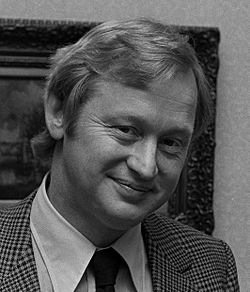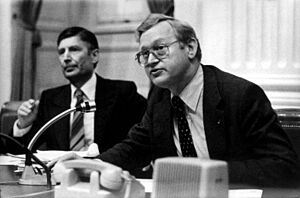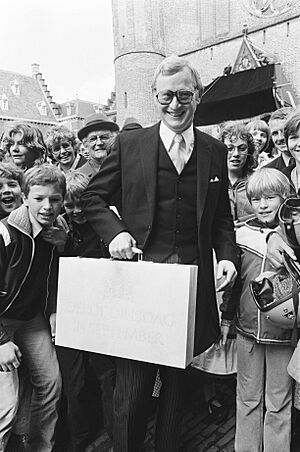Frans Andriessen facts for kids
Quick facts for kids
Frans Andriessen
|
|
|---|---|

Andriessen in 1972
|
|
| European Commissioner |
|
| In office 6 January 1981 – 6 January 1993 |
|
| President |
See list
|
| Preceded by | Henk Vredeling |
| Succeeded by | Hans van den Broek |
| Member of the Senate | |
| In office 16 September 1980 – 6 January 1981 |
|
| Parliamentary group | Christian Democratic Appeal |
| Minister of Finance | |
| In office 19 December 1977 – 22 February 1980 |
|
| Prime Minister | Dries van Agt |
| Preceded by | Wim Duisenberg |
| Succeeded by | Gijs van Aardenne (Ad Interim) |
| Leader of the Catholic People's Party |
|
| In office 1 October 1971 – 25 May 1977 |
|
| Preceded by | Gerard Veringa |
| Succeeded by | Office discontinued |
| Parliamentary leader in the House of Representatives |
|
| In office 16 August 1971 – 25 May 1977 |
|
| Preceded by | Gerard Veringa |
| Succeeded by | Office discontinued |
| Parliamentary group | Catholic People's Party |
| Member of the House of Representatives |
|
| In office 23 February 1967 – 19 December 1977 |
|
| Parliamentary group | Catholic People's Party |
| Personal details | |
| Born |
Franciscus Henricus Johannes Joseph Andriessen
2 April 1929 Utrecht, Netherlands |
| Died | 22 March 2019 (aged 89) Bilthoven, Netherlands |
| Political party | Christian Democratic Appeal (from 1980) |
| Other political affiliations |
Catholic People's Party (until 1980) |
| Spouse |
Catherine Andriessen
(m. 1955) |
| Alma mater | Utrecht University (LL.B., LL.M.) |
| Occupation | Politician · Jurist · Businessperson · Corporate director · Nonprofit director · Lobbyist · Professor |
Frans Andriessen (born April 2, 1929 – died March 22, 2019) was an important Dutch politician and businessman. He was a member of the Catholic People's Party and later the Christian Democratic Appeal party. He is best known for serving as a European Commissioner for 12 years, from 1981 to 1993.
Contents
Frans Andriessen's Early Life and Career
Frans Andriessen was born in Utrecht, Netherlands. He studied Law at Utrecht University and earned a master's degree. After finishing his studies, he worked for a construction company in Utrecht. He even became the CEO (Chief Executive Officer) of the company in 1961.
Entering Dutch Politics
Andriessen began his political career in the Netherlands. In 1967, he was elected as a member of the House of Representatives, which is part of the Dutch Parliament. He focused on housing issues.
In 1971, he became the leader of the Catholic People's Party in the House of Representatives. This meant he was the main spokesperson for his party.
Becoming Minister of Finance
In 1977, Frans Andriessen was appointed as the Minister of Finance for the Netherlands. This is a very important job, as the Minister of Finance manages the country's money and budget. He took office on December 19, 1977.
He wanted to make bigger cuts to government spending than his party agreed with. Because of this disagreement, he resigned from his position in February 1980. After this, he became a member of the Senate, another part of the Dutch Parliament.
Frans Andriessen as a European Commissioner
In 1981, Frans Andriessen was chosen to be a European Commissioner. A European Commissioner is like a minister for the entire European Union. They are responsible for different areas, like trade or agriculture, across all member countries.
First Term: Competition and Parliament
From 1981 to 1985, Andriessen was the European Commissioner for Competition. This meant he worked to make sure businesses competed fairly and didn't create monopolies. He also handled relations with the European Parliament. One famous case he settled was with the company IBM in 1984.
Second Term: Agriculture and Fisheries
In 1985, he was re-appointed for a second term. This time, he became the Commissioner for Agriculture and Fisheries. This was a very challenging role. He also became the First Vice-President of the European Commission, which is a high-ranking position.
He worked on many issues, like preventing too much lamb from being produced (a "lamb mountain"). He also tried to get European countries to agree on farm budgets and reduce milk production. He introduced the idea of "set-aside," where farmers were paid not to grow certain crops to reduce surpluses.

Third Term: External Relations and Trade
From 1989 to 1993, Andriessen served his third term. He was in charge of External Relations and Trade. This meant he dealt with how the European Union worked with countries outside of Europe. He kept his role as First Vice-President.
He played a big part in the Uruguay Round of GATT talks. These were important discussions about global trade rules. He also worked on creating a "European Economic Space" to help countries like those in Eastern Europe, especially after the fall of the Berlin Wall. This helped them get closer to the European Union.
His final years were focused on completing the GATT agreement, which aimed to make trade fairer around the world. This agreement eventually led to the creation of the World Trade Organization (WTO).
Frans Andriessen's Later Life and Legacy
Frans Andriessen retired from active politics when he was 62. However, he continued to be involved in many important areas. He served on various government commissions and worked as a professor of European integration at his old university, Utrecht University.
He was known as a skilled negotiator and someone who could help different groups reach agreements. He continued to share his opinions on political matters until he passed away in March 2019 at the age of 89. He was the second longest-serving Dutch European Commissioner.
Personal Life
Frans Andriessen married Catherine Ten Holter in 1955. They had four children.
Awards and Honors
Frans Andriessen received many awards and honors throughout his life for his work.
| Honours | ||||
| Ribbon bar | Honour | Country | Date | Comment |
|---|---|---|---|---|
| Knight of the Order of the Holy Sepulchre | Holy See | 1972 | ||
| Knight of the Order of the Netherlands Lion | Netherlands | 15 May 1980 | ||
| Grand Officer of the Legion of Honour | France | 12 February 1982 | ||
| Grand Cross of the Order of Merit | Germany | 13 May 1983 | ||
| Grand Cross of the Order of Leopold II | Belgium | 15 December 1990 | ||
| Knight Grand Cross of the Order of Orange-Nassau | Netherlands | 19 January 1993 | Elevated from Officer (30 April 1969) | |
Honorary Degrees
He also received an honorary degree from Utrecht University in 1992 for his contributions to law.
| Honorary degrees | ||||
| University | Field | Country | Date | Comment |
|---|---|---|---|---|
| Utrecht University | Law | Netherlands | 1992 | |
See also
 In Spanish: Frans Andriessen para niños
In Spanish: Frans Andriessen para niños
 | James Van Der Zee |
 | Alma Thomas |
 | Ellis Wilson |
 | Margaret Taylor-Burroughs |


